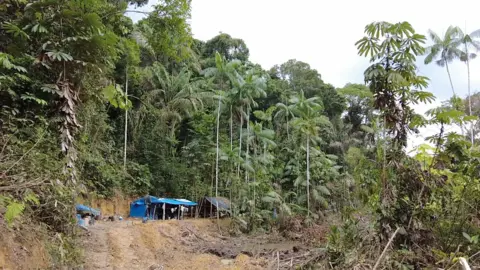
Selling sex for gold in the Amazon's illegal mines
- Published By Jane Njeri For The Statesman Digital
- 10 months ago
Dayane Leite never wanted to become a sex worker but at the age of 17 her husband died of a heart attack and she couldn’t pay for the funeral.
Her home town, Itaituba in Brazil’s northern Para state, is at the heart of the country’s illegal gold-mining trade, so a friend suggested raising the money by having sex with miners, deep in the Amazon.
“Going to the mines is a roll of the dice,” she says.
“The women are seriously humiliated there. They may be slapped in the face and yelled at.
“I was sleeping in my bedroom and a guy jumped through the window and put a gun to my head. And if they pay, they want to own the women.”
Dayane successfully gathered the money for the funeral, and at the age of 18 she had her first child. For the last 16 years, like many women in Itaituba, she has been returning periodically to the mines to work as a cook, a washerwoman, a barmaid and a sex worker.
She now has a family of seven to support.

“I'm not going to say that all the women in the city do it, but a fair share of them do sex work. So it’s kind of normal. We don’t really care,” says Natalia Cavalcante, who became a sex worker in a remote mining settlement at 24. Four years later, after marrying the owner of a bar, she became the madam of a brothel – a job she only gave up recently, to look after her nieces in the city.
Life in mining villages in the rainforest is harsh - most consist of just a dirt track, saloon bars and a church. But the miners themselves live even further out, in shacks made of wood and canvas, surrounded by snakes and jaguars, and in total darkness once the generator is switched off. Women working as cooks have to live in these camps, alongside the men.
The miners appear in the village whenever they have found gold and have money to spend, Natalia adds. Sometimes they have to be persuaded to have a shower before sex, women say.
Running a brothel is illegal under Brazilian law, but Natalia says she took no commission, she just employed bar staff and rented out rooms.
Young women would contact her asking for work, and she sometimes lent them money for the journey, a seven-hour drive from Itaituba.

Asked whether she had misgivings about involving other women in the work, she replied: “Sometimes I think: ‘I’ve been through that, and I know it’s not that nice.’ But then I think: ‘The girl has a family, sometimes a child to raise. Many of the girls who go have one or two children.’ So we accept it.”
Even before marrying, Natalia had made a lot of money.
She now has her own house in Itaituba, a motorbike, and considerable quantities of gold that she sometimes received as payment for sex, two or three grams at a time. Her goal is to study, to become a lawyer or an architect.
Some women in Itaituba, nicknamed Gold Nugget City, have set themselves up in business with the money they made, she says.
But it’s a big risk to venture as a woman into the violent and lawless mining settlements.
While the environmental harm of the mines is well known, the human cost - which the UN says includes violence, sexual exploitation and trafficking - goes largely unreported.
A dealer in precious metals told the BBC that the illegal gold from these mines would typically be relabelled as gold from a licensed mining co-operative, before being exported and turned into jewellery and components for mobile phones, or other electronic goods.
The three largest customers of Brazilian gold are Canada, Switzerland and the UK. More than 90% of all exports to Europe are from areas where illegal mining occurs, according to the Instituto Escolhas think tank.

It’s not unknown for women to be murdered in mining villages. The dead body of 26-year-old Raiele Santos was found last year in the room where she had been living near the Cuiú-Cuiú gold mine, 11 hours’ drive from Itaituba.
Her elder sister, Railane, says a man had offered her money for sex and she had refused, so he found her later and beat her to death.
“A lot of women die on a daily basis, a lot of women,” Railane says.
“I was born in the mines, I grew up in the mines, and now I'm afraid to live in the mines.”
A man has been arrested in connection with Raiele’s murder, but has not yet been tried. He denies all the charges against him.
The land covered by Brazil’s illegal gold mines more than doubled in the 10 years to 2023, to 220,000 hectares – an area larger than Greater London. No-one knows how many women work in this area, or even how many illegal miners there are. The Brazilian government says the latter figure could be anywhere from 80,000 to 800,000.
Under President Luiz Inácio Lula da Silva, the government has taken steps to close illegal mines and to stop dealers buying the gold they produce, but high gold prices continue to drive many men to try their luck.
Dayane wants to stop working in the mining areas because of the risks and the toll the hardship takes on her body, but she is planning what she hopes will be one last trip. Her goal is to earn enough in two or three months to open a snack bar on her return, though she realises she may not succeed.
Whenever she is alone, walking in the forest, she will worry about her children, she says.
“I will keep trying, until I can’t any more,” she says. “Because I think that one day, my children will say: ‘My mum worked so hard. She went through what she went through for us, and she never gave up.’”
Share on
Tags
SHARE YOUR COMMENT
MORE STORIES FOR YOU
Trending Stories
DJ Mo’s former illicit lo...
- Published By Jane
- January 15, 2024
Mapenzi! Zari and Tanasha...
- Published By Jane
- October 24, 2023
Zuchu Speaks on Diamond P...
- Published By Jane
- October 12, 2023
Hio Ni Upumbavu Wasituche...
- Published By Jane
- November 8, 2023
RECOMMENDED FOR YOU
Your Lungs Hold Secrets A...
- Published By The
- September 11, 2025
Better Sleep?: See The Li...
- Published By The
- September 11, 2025
What to Know About iPhone...
- Published By The
- September 11, 2025
From Teacher to Mwalimu N...
- Published By The
- September 11, 2025
Latest Stories
From Last-Gasp Winners to...
- Published By The
- October 6, 2025
Ten Games and Three Goals...
- Published By The
- October 6, 2025
French Prime Minister Séb...
- Published By The
- October 6, 2025
"Shame on Him": Cera Iman...
- Published By The
- October 6, 2025



